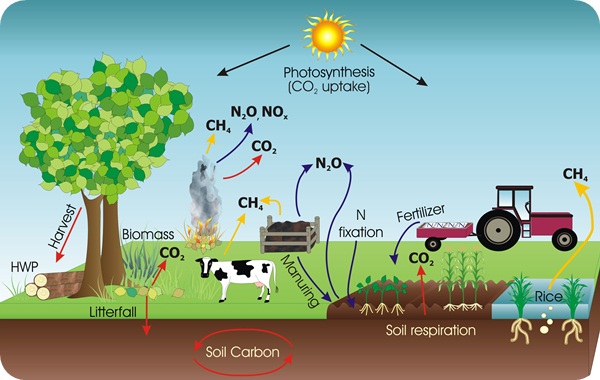Training for project developers, consultants, researchers, students...
This course is designed for project developers, project verifiers, land managers, consultants, researchers, and students with an interest in understanding and quantifying greenhouse gas (GHG) emissions and C stocks in complex agricultural, forest and land use systems. Skills and knowledge gained in this course may be applied to GHG offset project management, product supply change analysis, research or GHG inventories. Additionally, methods taught in this course may be utilized anywhere in the world.
Sources and sinks of GHG emissions in agriculture, forests, and other land use systems
Key greenhouse gases in agriculture, forests and other land use (AFOLU) systems are carbon dioxide (CO2), nitrous oxide (N2O) and methane (CH4). Full GHG accounting in these systems requires that sources and sinks of all three gases are estimated.
Sources of GHG in AFOLU systems include:
- CO2 from biomass decomposition and burning
- CO2 from soil respiration
- N2O from soil, manure management, and biomass burning
- CH4 livestock, manure management, rice management, and biomass burning
- CO2 emissions from on-farm/forest energy use
Sinks of GHG in AFOLU systems include:
- CO2 uptake in soils and woody biomass
Sources and sinks of GHG emissions in agriculture, forests, and other land use systems (IPCC 2006)
Current assessment methods, tools, and protocols
Accounting methods and tools:
- COMET-Farm: A web-based, decision support calculation tool that enables full GHG accounting at the farm-level in the conterminous U.S., by accounting for emissions from agricultural land management, livestock, energy and other sources.
- Comet 2.0: A web-based, decision support calculation tool that estimates changes in soil carbon storage and GHG emissions from agricultural management on croplands, grasslands, orchards, vineyards, and agroforestry systems in the conterminous U.S.
- Carbon Benefits Project (CBP): A set of web-based tools for estimating the impact of land management projects on carbon stock changes and GHG emissions.
- Agriculture and Land Use Greenhouse Gas Inventory (ALU) Software: Guides an inventory compiler through the process of estimating greenhouse gas emissions and removals related to agricultural and forestry activities.
- Intergovernmental Panel on Climate Change (IPCC): The IPCC has developed guidelines for national inventories of greenhouse gases which provide widely applicable default methodologies that are suited for global use, and may be adapted for use at the project-level.
- 2006 IPCC Guidelines for National Greenhouse Gas Inventories
- Good Practice Guidance for Land Use, Land-Use Change and Forestry, 2003
- Cool Farm Tool: A greenhouse gas calculator to help growers measure the carbon footprint of their crop and livestock products.
- EX-ACT (Ex Ante Appraisal Carbon-balance Tool): Provides ex-ante estimations of the impact of agriculture and forestry development projects on GHG emissions and carbon sequestration.
Standards and Protocols:
- Verified Carbon Standard (VCS): A greenhouse gas accounting program used by projects around the world to verify and issue carbon credits in voluntary markets.
- American Carbon Registry : A non-profit U.S. carbon market standard and registry.
- Climate Action Reserve: A U.S. offset program that sets out emissions reductions protocols and registers projects.
- World Resources Institute GHG Protocol: A corporate accounting and reporting standard.
- Plan Vivo: A standard for designing and certifying community-based payments for ecosystem services programs.
- The Gold Standard: A certification standard for carbon mitigation projects relating to renewable energy and/or energy efficiency technologies.
International Programs and Registries:
Reports and Resources
- Greenhouse Gas Emissions from U.S. Agriculture and Forestry: A Review of Emission Sources, Controlling Factors, and Mitigation Potential
- Report of Greenhouse Gas Accounting Tools for Agriculture and Forestry Sectors
- Technical Working Group on Agricultural Greenhouse Gases (T-AGG) Reports
- Carbon Sequestration and Greenhouse Gas Fluxes in Agriculture: Challenges and Opportunities
- Climate Change 2007: Working Group III, Mitigation of Climate Change: Agriculture and Forestry
